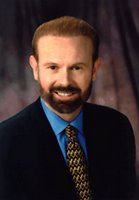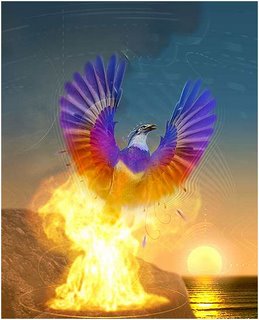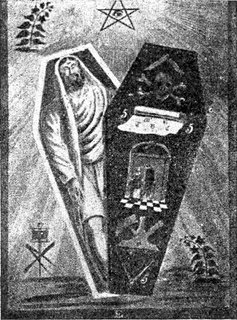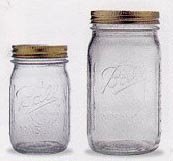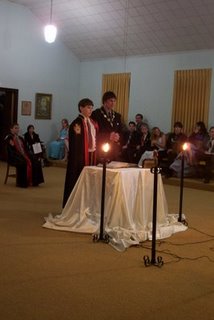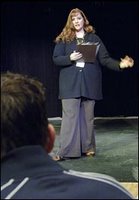
It seems like every week or so I discover another new Masonic blog or website. Internet-savvy Masons in general seem to me to be more enlightened, more interested in esoterica and in restoring Freemasonry to that which it once was, than do our elder non-Internet-using brothers. More than just an age difference, I think it reflects a different attitude towards Life.
Our elder brethren came of age during the World War II-Korean War era, in a world that still (at least superficially) resembled a Norman Rockwell painting. Even today, in smaller towns, especially in the South, Life still plods along like it's Mayberry, R.F.D., and "traditional" values haven't changed so much. The older lodge members were already fathers or about to become fathers when the tradition-changing 1960s came along. Clinging to their roots, they held fast and became even more neo-phobic — afraid of change — shunning ideas like sexual and racial equality, free thought in spiritual and religious matters, etc.
During the sixty years since WWII, Freemasonry has seen a great rise, and then an even more dramatic drop, in interest and in membership. Since the 1960's membership has fallen, especially in urban areas, leaving smaller, more rural lodges making up a greater percentage of the Masonic population.
I guess it was inevitable that these smaller lodges took on the personality of the small towns they were in, reflecting the political and religious views of their members. Cliques took over; good ol' boy networks of Past Masters began running lodges from behind the scenes, leaving current officers "in charge" in name only until they'd bent their own personalities into the "group think" mentality of the older brethren. The beautiful, scripted prayers to the Great Architect of the Universe, intended to be recited or read during lodge meetings, were replaced by chaplains who were ordained ministers praying loud and long to Jesus, despite the admonition against religious sectarianism in the Lodge Room.
With suburban sprawl, highways led "city boys" to the country. The Information Superhighway had opened the educated professionals' minds to seek the ancient and historical lessons and secrets of Freemasonry. It was inevitable that Culture Clash would eventually arrive behind the Tyled Door.
Most of the newcomers to Freemasonry didn't stay around long. Some continue to keep paying their dues — because they still want to
belong — but they seldom darken the doors of their lodges anymore. They quickly discovered that the old men in their local lodges didn't have any esoteric secrets to share. Sure, there were always men in the lodge who knew the catechisms well enough to teach them to the newcomers, but few of the teachers could explain the meanings of the rituals. Many couldn't even pronounce some of the words correctly.
Some hardy souls who became Masons stuck it out. They felt that sense of camaraderie, that sense of brotherhood, that sense they had become part of something special. They felt something greater than themselves, something mystic, even though what they were seeing with their eyes didn't match. Inwardly, they felt a mystical tie with, if not all the brethren, at least with someone in the lodge. Perhaps it was the man who signed their petition, perhaps the man who acted as Worshipful Master and raised them, or perhaps they felt this sense of brotherhood with the man who coached them through their catechisms.
Outwardly, though, the new Mason probably saw this: Men 20 to 30 years their senior, most of whom reminded them more of their grandfathers than their fathers, whose religious and ultra-conservative political views were, to the new Mason, anachronistic, old-fashioned... and... in spite of the rules the new Mason had been handed, openly touted in the Lodge.
While there were successful older men in the lodge, their rural upbringing and their WWII/Korean War era military service had offered most of the older, locally-born lodge members little in the way of higher education... another cause of Culture Clash with the newly-arrived, city-bred, educated, esoterica-seeking new Mason.
At this point in your reading, I must interject to say this: I'm talking here about
my experience. I am the younger, city-bred, college-educated, Internet-savvy, esoterica-seeking newer Mason that moved to a small town in north Georgia and then became a Freemason after meeting a generous, kind, and compassionate (and unusual for the area, college-educated) local-born Mason who "adopted" my entire family as his own, and through his upright manner, led me to want to become a Mason, too.
I loved (and still love) Masonry. When I joined, I jumped right into the lodge, and have held all the floor offices up to and including Junior Warden, and have acted as both Senior Warden and Worshipful Master on several occasions. I was one of those
guys who was there "every time the doors were open." I even earned an honorary membership at another lodge, I was so active.
I was respectful of the obvious differences between myself and the more rural brethren, and for quite some time sublimated my personality for sake of "peace and harmony" and for the "good of the Order."
A member of our lodge — another "outsider," an 80-year-old native Canadian medical doctor who had transfered his membership to the lodge from the metro Atlanta area a few years earlier — and I became fast friends. Brother Bob was our lodge's Director of Masonic Education. He had traveled the world extensively, and during his travels he always tried to visit lodges in other countries.
He would bring back stories and photos and Masonic coins and trinkets and often have a show-and-tell during his talks in lodge meetings.
One day Bob asked me to come to his house. When I arrived, he confided in me that he was dying, that he'd been given less than six months to live. He asked me not to tell anyone, because "people treat you differently when they know you're dying." As a medical doctor, I'm sure he'd seen that phenomenon many times with his patients.
Bob had no sons, only daughters. As an educated man, he had collected many books, magazines, and articles about Freemasonry over his Masonic career, and he wanted me to have them all. That day we filled the trunk and backseat of my car with a library's worth of Masonic literature. I was honored he had chosen to give his materials to me.
Worshipful Brother Bob died three months later. I still miss him. The lodge named me as his successor, the new Director of Masonic Education.
Not having traveled and visited lodges around the world like Bob had, I focused my lectures on Masonic history, Masonic etiquette and Masonic values.
The first thing I learned was that old men have very short attention spans. The second thing I learned was that most of them didn't care a hoot about Masonic history, Masonic etiquette, or Masonic values. "Greet, eat and meet" were the three watchwords, unless there was degree work to be done. Undaunted, I continued studying about Freemasonry and then, true to my "job" as Director of Masonic Education, I prepared lectures to educate my brethren.
One of my best lectures ever was given at an open meeting attended by over a hundred members and visitors, including all of the Grand Lodge officers, at our flagpole dedication ceremony. I received a rousing ovation after delivering a talk on how the Pledge of Allegiance came into being, and several requests for copies of my talk.
The Worshipful Master at the time, however, began to find reasons to not let me speak. "We're going too long," he said nearly every other meeting, though what we "went long" on was usually bill-reading and other non-Masonic time-wasters and overly-long recitals of who was sick with what disease, and how they were related to someone, followed by yet another long prayer for each sick person by name. (Did I mention, the lodge meetings more and more came to resemble a Wednesday night Baptist prayer meeting?) Occasionally, the WM would ask me what my topic was to be, and then tell me that it was too "controversial" and that I would upset the "peace and harmony" of the lodge. I soon realized that if I wanted to continue to speak, I had better stick to safe topics like short biographies of famous Masons.
Privately, I consulted with that particular WM and with a Past Master about something that bugged me more and more each time it happened — the long, drawn-out prayers addressed to and spoken in the name of Jesus, sometimes led by a kneeling brother who would actually weep or cry out as he prayed. I saw more than one newly raised Mason not come back after an ordained minister called down Jesus upon the lodge as the candidate was being Raised.
When I pointed out, in private, that the rules of Freemasonry and of the Grand Lodge of Georgia said that we should not be saying sectarian prayers, the WM told me, "It's the spirit of the law we should uphold, not the letter." The Past Master (who was about my age) whom I consulted privately — one of the most "guilty" of this particular breach of Masonic etiquette — simply told me, "You're right, Brother, but I'm not gonna change. That's the way I pray." Others later accused me of trying to control how a person prays.
I don't care how a person prays privately or if they pray at all. But in a Lodge, I think we should act like Masons and follow the rules and traditions of Masonry.

After failing to gain any ground with the WM and the PM, I brought it up in open lodge. I didn't do it blatantly, but calmly and in the guise of a lecture about Grand Lodge rules and how following them is what defines us as Georgia Masons. I later wrote about my experience that night, in an article I called "The Christianization of Freemasonry," and posted it on an Internet Masonic forum where I found that most Masons agreed with me and were aghast at what happened. The article was eventually seen by my local lodge brothers, and has now become known as the "Bucket of Rattlesnakes" article.
Here's the short essay I called "The Christianization of Freemasonry."
Our lodge routinely invokes Jesus in every prayer uttered. No one in the lodge has even memorized the prayer to GAOTU (who?, they would say) in our Manual that is to be used in opening and in ritual work. EA's and FC's and MM's are prayed over by red-faced ministers and lay-ministers who pray for souls to be won to "the Lord" and the ill to be healed. I'm embarassed for the new members, but most of them seem to think that's the way it's supposed to be. I try to ignore it, thinking "it is what it is" and try to do my part in raising the consciousness of my brethren, but I'm probably just spinning my wheels paying off Karmic debt or something.
As part of a lecture in lodge several months ago, I was elaborating on the principles of the Grand Lodge of Georgia, and how as Georgia Masons we are "defined" in a way by those rules we had sworn to uphold. It was a pretty cut-and-dried talk, not one of my best, just sorta going over some basics...
...until I read paragraph #5: "It [Freemasonry] is religious in that it teaches monotheism; the Volume of the Sacred Law is open upon its altars whenever a Lodge is in session; reverence for God is ever present in its ceremonial, and to its brethren are constantly addressed lessons of morality; yet it is not sectarian or theological." I simply added this comment:
"Brethren, that means, technically, that we should not be closing our prayers 'in Jesus's name', but rather simply direct our prayers to God."
You would have thought I'd asked everyone to disrobe, kill a virgin and sing Sympathy for the Devil or something! You've never seen a bunch of bored old fish-fry Masons come to life so quickly!
I lost the floor immediately in a torrent of unhappy and unpleasant comments, most of which came from Past Masters who you'd think that, if they didn't know better about the context, at least would know better about the decorum of jumping down my throat.
- "You ain't puttin' no other book on that altar!"
- "We can pray any way WE want!"
- You're talking about idols! They worship idols!"
- "I don't see no Jews or Muslims in here! We ain't gotta worry about that!"
- [my favorite] "I thought you had to be a Christian to be a Mason!"
The exclamation points were there, in their voices. I was amazed at how ruffled their feathers were. I was more than amazed — I was astounded.
And though I certainly didn't mean to cause such an uproar, I guess deep down I actually enjoyed it. It was the most exciting Blue Lodge meeting I had ever been to. Finally, people were at least paying attention and having an opinion.
One good Brother (a Christian, but one who didn't agree with the Mountain Baptist reactionaries) stood to talk on the point, and was basically told to sit down.
"We could go on about this all night, but I'm not gonna stand for it!," one PM stated, flailing his arms in the air.
Afterwards, one young Mason — who agreed with me in theory but not in practice — who grew up here in the mountains, going to the same Mountain Baptist churches the upset elder Brethren did, spoke with me after the meeting, saying, "You didn't just open up a can of worms... you knocked over a bucket of rattlesnakes."
Not content just to have rocks thrown at me (figuratively) for pointing out a Masonic truism, it was my fate to learn yet more about small town Freemasonry.
About the same time that I gave the "rattlesnake lecture," I was instructed by the lodge, in my capacity as Junior Warden, to draw up Masonic charges against a member of our lodge who had pleaded guilty in state court to having sex with a 16-year-old.
Little did I realize that doing my Masonic duty and filing those Masonic charges as instructed with our lodge's Secretary would lead to my being cursed and physically threatened at the Lodge by the Accused after he pleaded guilty to the Masonic charges, and later to having charges of unMasonic conduct threatened against me by a Grand Lodge member for following Masonic Code by publicizing the child-exploiter's state and Masonic convictions.
More to come....
— Widow's Son
Go to Small Town Freemasonry — Part Two: The Masonic Ambush
Small Town Freemasonry — Part Three: A Day in the Life of a Junior Warden
Freemasonry |
Grand Lodge of GeorgiaMasonic Code |
Masonry |
Masons |
RattlesnakesGAOTU |
Christianity |
Baptists |
Small Town Intolerance
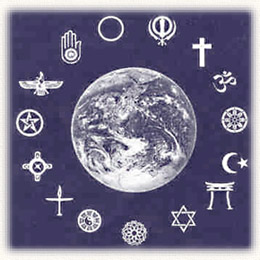 How is it that most anti-Mason conspiracy theorists — you know, the ones that say Freemasons worship the Devil or "false gods," etc. — are Southern Baptists, and, a very high percentage of Freemasons, at least in the southeast, are Southern Baptists? How can that be? And what is it about Baptists that makes them more likely than others to act so hateful towards those who don't agree with them doctrinally? Why do they think of themselves as God's Chosen People?
How is it that most anti-Mason conspiracy theorists — you know, the ones that say Freemasons worship the Devil or "false gods," etc. — are Southern Baptists, and, a very high percentage of Freemasons, at least in the southeast, are Southern Baptists? How can that be? And what is it about Baptists that makes them more likely than others to act so hateful towards those who don't agree with them doctrinally? Why do they think of themselves as God's Chosen People?

